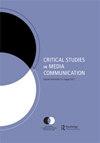构建女性的愤慨:2019-2021年墨西哥妇女动员的新闻报道
IF 1.5
2区 文学
Q3 COMMUNICATION
引用次数: 0
摘要
墨西哥的妇女动员由于暴力抗议策略而引起争议。此外,政府指责他们被保守的反对派操纵。本研究运用框架分析法,分析了墨西哥三家不同意识形态取向的报纸在2019年至2021年对妇女动员的新闻报道。调查结果指出,三家报纸的主要框架使动员合法化。然而,尽管报纸的意识形态取向是相关的,但它并不能自动定义对特定框架的偏好,这表明一种现象的新颖性转化为框架的创造者和接受者之间更重要的互动。本文章由计算机程序翻译,如有差异,请以英文原文为准。
Framing women’s indignation: news coverage on women’s mobilization in Mexico, 2019–2021
ABSTRACT Women’s mobilizations in Mexico have caused controversy due to violent protest strategies. Also, the government discredited them as being manipulated by the conservative opposition. This study analyzes press coverage of women's mobilizations from 2019 to 2021 in three Mexican newspapers with different ideological orientations, applying frame analysis. The findings point to the predominant frames in the three newspapers as legitimizing the mobilization. However, although the ideological orientation of a newspaper is relevant, it does not automatically define a preference for specific frames, suggesting that the novelty of a phenomenon translates into a more significant interaction between the creators and receivers of the frames.
求助全文
通过发布文献求助,成功后即可免费获取论文全文。
去求助
来源期刊

Critical Studies in Media Communication
COMMUNICATION-
CiteScore
2.10
自引率
0.00%
发文量
34
期刊介绍:
Critical Studies in Media Communication (CSMC) is a peer-reviewed publication of the National Communication Association. CSMC publishes original scholarship in mediated and mass communication from a cultural studies and/or critical perspective. It particularly welcomes submissions that enrich debates among various critical traditions, methodological and analytical approaches, and theoretical standpoints. CSMC takes an inclusive view of media and welcomes scholarship on topics such as • media audiences • representations • institutions • digital technologies • social media • gaming • professional practices and ethics • production studies • media history • political economy. CSMC publishes scholarship about media audiences, representations, institutions, technologies, and professional practices. It includes work in history, political economy, critical philosophy, race and feminist theorizing, rhetorical and media criticism, and literary theory. It takes an inclusive view of media, including newspapers, magazines and other forms of print, cable, radio, television, film, and new media technologies such as the Internet.
 求助内容:
求助内容: 应助结果提醒方式:
应助结果提醒方式:


